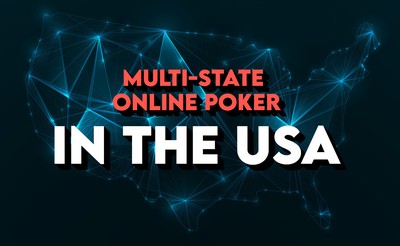Multi-State Online Poker in the US
Find out what multi-state poker means, why it’s important, and which states are included in the interstate gaming compact for poker known as the Multi-State Internet Gaming Agreement (MSIGA).
Last Updated: June 10, 2025
- BetRivers Poker is live in Michigan, Pennsylvania, West Virginia and Delaware!
- Deposit match bonus up to $1000 ($250 in DE)
- Lowest rake in the US & a generous rewards program.
- Modern software and unique features offers one-of-a-kind poker experience.
- One network connecting Nevada, Michigan, NJ, and PA
- Online bracelet events.
- $1,100 in welcome bonuses for new players.

- Network connects New Jersey and Michigan.
- Separate poker site in PA, ready for shared liquidity.
- $150 freeplay or $600 welcome bonus.
 US multi-state online poker refers to regulated real money online poker operators in the United States connecting their online poker rooms together. For example, players on BetRivers Poker in Michigan will also play against those on BetRivers Poker in Pennsylvania, Delaware and West Virginia.
US multi-state online poker refers to regulated real money online poker operators in the United States connecting their online poker rooms together. For example, players on BetRivers Poker in Michigan will also play against those on BetRivers Poker in Pennsylvania, Delaware and West Virginia.
Also called cross-state or interstate online poker, this concept is very important to the poker world because it means there are more players in the overall player pool. It makes for bigger tournaments and more cash game action, allowing operators to offer bigger guarantees and spread more game types around the clock. Also called “shared liquidity,” it is critical to a healthy online poker ecosystem.
- Allow regulated real money online poker
- Have real money online poker regulations that allow cross-state play
- Have signed the Multi-State iGaming Agreement (MSIGA)
- Have authorized the real money online poker room to take advantage of the agreement
As of 2025, six states — Michigan, Nevada, New Jersey, and Pennsylvania, Delaware and West Virginia — tick every box. Pennsylvania was the last state to join the MSIGA, officially entering the agreement in April 2025.
BetRivers Poker currently has a combined player pool in Michigan, Pennsylvania, Delaware and West Virginia creating a four-state network. WSOP Online also has a four-state player pool in Michigan, Nevada, New Jersey, and Pennsylvania. BetMGM Poker now combines player pools in Michigan, New Jersey, and Pennsylvania. PokerStars USA started to take advantage of this opportunity on New Year’s Day 2023, when it combined its player pools between Michigan and New Jersey.
This guide will look into all of the different aspects of multi-state real money online poker, including its history, legislation, the current landscape, and what is likely to come.
| Multi-State Online Poker: Key Facts | |
|---|---|
| ⚖️ Legal Agreement Allowing Interstate Poker | Multi-State Internet Gaming Agreement (MSIGA) |
| 🥜 What MSIGA Does (In a Nutshell) | Allows online poker operators to share liquidity and combine player pools between member states |
| 📍 Current Member States | Delaware, Michigan, Nevada, New Jersey, West Virginia, and Pennsylvania |
| 📅 When Joined MSIGA | DE and NV (2014), NJ (2017), MI (2022), WV (2023), PA (2025) |
| 👥 Member State Populations | MI (10 Million), NJ (9.3 Million), NV (3.2 Million), WV (1.8 Million), DE (1 Million), PA (13 million) |
| 🔗 Active Multi-State Poker Networks | BetRivers Poker, WSOP Online, PokerStars USA and BetMGM Poker | 🍦 BetRivers Poker = | BetRivers Poker MI + BetRivers Poker DE + BetRivers Poker PA + BetRivers Poker WV |
| 🧁 PokerStars USA = | PokerStars MI + PokerStars NJ |
| 🍰 WSOP Online = | WSOP MI + WSOP NJ + WSOP NV + WSOP PA |
| 🍭 BetMGM Poker = | BetMGM Poker MI + BetMGM Poker NJ + BetMGM Poker PA |
How Did We Get Here? US Multi-State Online Poker History
- April 2011: Obama DOJ uses Wire Act as tool for online poker crackdown, aka Black Friday.
- December 2011: DOJ letter clarifies Wire Act limited to sports betting.
- December 2018: Trump administration DOJ reinterprets the Wire Act.
- February 2019 New Hampshire Lottery Commission (NHLC) challenges this opinion
- June 2019: Judge rules in favor of NHLC.
- June 2019: DOJ appeals decision and extends enforcement deadline.
- January 2021: United States Court of Appeals for the First Circuit upholds lower court decision.
- May 2022: Michigan joins MSIGA.
- January 2023: PokerStars launches multi-state online poker, combining its New Jersey and Michigan player pools.
- November 2023: West Virginia joins MSIGA.
- May 2024: WSOP combines Michigan, New Jersey and Nevada player pools.
- Oct 2024: Pennsylvania takes first steps to join MSIGA.
- Nov 2024: BetMGM Poker joins Michigan and New Jersey player pools.
- Apr 2025: Pennsylvania joins MSIGA.
- Apr 2025: BetMGM Poker and WSOP bring PA players into their existing networks.
- June 2025: Delaware returns after 18 months online poker blackout.
- June 2025: West Virginia launches online poker for first time.
- June 2025: BetRivers launches in MI, WV and DE.
However, in 2014, Nevada and Delaware signed the first multi-state poker agreement, allowing them to combine player pools across state borders. Then, in 2017, New Jersey joined the agreement, creating a three-state compact known as the MSIGA (Multi-state Internet Gaming Agreement), which looked promising.
Regulated states combining their player pools would create a much bigger network with better traffic and bigger potential. But things came to a halt quickly thereafter, with the DOJ moving in to try and apply the Wire Act to real money online poker. While Nevada, New Jersey, and Delaware kept their interstate compact, this was not a good sign for any new states that were about to regulate real money online poker, at least in terms of entering multi-state poker compacts.
After a lengthy legal battle on multiple fronts, things are finally starting to look better. Michigan joined MSIGA in April 2022, and West Virginia followed suit in November 2023. In April 2025, Pennsylvania became the sixth member of the MSIGA.
As of June 2025 BetRivers has combined its network in Michigan, Pennsylvania, Delaware and West Virginia. It is the first online poker site to launch in WV and it ends the 18 month online poker blackout in Delaware.
The First Multi-State Poker Compact (MSIGA)
Nevada and Delaware were the first US states to pass real money online poker legislation. This happened in 2012, announcing the new era of regulated real money online poker in the United States. However, these laws were only applicable to relevant states, meaning NV and DE could only offer real money online poker to people physically present within their borders.
In 2014, Nevada and Delaware decided to establish the first (and so far only) multi-state online poker agreement, known as the Multi-state Internet Gaming Agreement (MSIGA). The agreement allowed for sharing players across state borders, meaning players from both states could play together at the same tables.
This was a landmark moment, as it hinted at a possibility of a US-wide poker network as more states would pass their own laws and potentially enter the agreement.
New Jersey was one of these states. Real money online poker was legalized in 2013, and the Garden State became the third regulated market in the US. Although the legislation was passed early that year, the first real money poker sites only went live in November 2013.
It took a few years before New Jersey joined MSIGA. The state finally joined in October 2017, when New Jersey signed the agreement with DE and NV, allowing for shared player pools among all three states. As far as operators are concerned, The WSOP US app was the only one to really profit from this deal, as they were (and still are) the only site to have a presence in all three markets.
At this point in time, several other states were on the brink of passing their own legislation, and it was expected that these states would be willing to join the MSIGA as well. However, the US Department of Justice had other plans and put any such hopes on ice for several years.
Multi-State Poker Hindered by the Wire Act
The Federal Wire Act (also known as the Interstate Wire Act) was passed in 1961, making it illegal to place wagers across state lines using wire communication facilities. The Act was aimed at putting a stop to criminal syndicates operating in the country. At the time it was passed, online gambling of any type, let alone online poker, was a distant dream at best.
In 2011, the DOJ released the opinion that the Wire Act did not cover any interstate communications that do not fall under the scope of sports betting. This conclusion encouraged states to enter interstate poker agreements.
However, in 2018, the Department of Justice reversed this conclusion, announcing that Act’s prohibitions were not limited to sports betting. The new conclusion made the Wire Act applicable to all forms of online gambling in the United States, including online poker.
This was bad news for the existing members of the MSIGA and any future prospects. And while New Jersey, Nevada, and Delaware decided to ride the wave and keep the agreement in place, newcomers to the market were reluctant to follow suit.
That included Pennsylvania and Michigan, which passed legislation to allow real money online poker in 2017 and 2019, respectively.
Legal Battle Ensues
The new Wire Act interpretation was unfavorable for many states that already had legalized online gambling or were looking to do so. But the New Hampshire Lottery Commission decided to take the DOJ to court and challenge their 2018 opinion.
The NH Lottery Commission asked for two things:
- For the court to declare that the Wire Act does not apply to state lotteries
- An order that prevents the DOJ from taking any action based on the 2018 interpretation
The wording of the lawsuit was such that, if accepted, it would automatically remove online poker and other gambling activities from the scope of the Wire Act as well, so this case had a lot of bearing on the future of multi-state poker.
The case was heard in front of the US District Court for the District of New Hampshire, and the judge ruled in favor of the NH Lottery, reverting the Wire Act interpretation back to 2011. However, the verdict did state that this decision would not prevent the federal government from prosecuting anyone who was not a part of this lawsuit. The court “set aside” the 2018 interpretation in a broad sense, but some ambiguity still remained.
The DOJ appealed the decision, and the case found its way to the United States Court of Appeals for the First Circuit. The appellate court upheld the 2019 decision, confirming that the Wire Act interpretation is limited only to sports betting activities.
This was a big victory for online gambling in the US, and especially for the prospects of interstate, regulated real money poker in the country. The Department of Justice had an opportunity to appeal this decision and take it to the Supreme Court, but they passed on the opportunity to do so, potentially ushering in a new era of real money online poker in the US.
Multi-State Poker in the US in 2025 & Beyond
With legal clarity that the Wire Act does not apply to online poker, states were free to decide without fear of federal prosecution or other ramifications. However, it was still unclear what these developments would mean for multi-state poker.
In April 2022, we got some clarity as Michigan joined MSIGA, becoming the fourth state in the compact. Michigan signing the agreement made it clear that regulated states would not seek to create new compacts but would rather continue to build upon the existing ones.
This was an important step for the operators in the state, as both PokerStars and BetMGM have a presence in Michigan and New Jersey, opening doors for them to combine player pools and create a bigger network.
PokerStars MI was quick to take advantage of this new opportunity. The operator got the necessary approval from the state regulator and, shortly after, launched its first multi-state network, combining its Michigan and New Jersey player pools. PokerStars USA officially went live on January 1, 2023.
West Virginia joined MSIGA in November 2023, becoming the compact’s fifth member. Up until now, real money online poker operators have avoided launching in the Mountain State because it was a small, segregated market. It will always be a small market, but now that the state is a member of MSIGA it won’t be a segregated one.
In April 2025, after a long wait, Pennsylvania became the sixth member-state of the MSIGA. BetMGM and WSOP Online were quick to take advantage of this development, combining their existing shared networks into one and bringing PA players into the fold just a few days later. PokerStars is likely to follow suit shortly.
In the same month BetMGM Poker has combined player pools in New Jersey, Michigan, and Pennsylvania, which will provide some great completion to PokerStars and WSOP Online. Not only does BetMGM share player pools across state lines, players on Borgata and PartyPoker also play on the BetMGM network — meaning as a site it can now rival the others in terms of cash game traffic.
With PA joining the MSIGA, there is potential for other significant developments. This is where BetRivers Poker enters the chat. As of June 2025 it has combined its networks in PA as well as launching in Michigan, West Virginia and Delaware — creating a huge shared player pool. It also ends the online poker blackout in Delaware and is the first online poker room to launch in West Virginia.
- 100% deposit match bonus up to $1000 ($250 in Delaware)
- State of the art online poker software in the US and the lowest rake!
- Modern software with built-in HUD, dynamic avatars and more — a truly unique poker experience.
US States and Multi-State Real Money Online Poker
| State | NJ | NV | DE | MI | PA | WV | CT | RI |
|---|---|---|---|---|---|---|---|---|
| Regulated Real Money Online Poker? | ✔️ | ✔️ | ✔️ | ✔️ | ✔️ | ✔️ | ✔️ | ✔️ |
| Active Real Money Online Poker Sites? | ✔️ | ✔️ | ✔️ | ✔️ | ✔️ | ✔️ | ❌ | ❌ |
| Member of MSIGA? | ✔️ | ✔️ | ✔️ | ✔️ | ✔️ | ✔️ | ❌ | ❌ |
| Authorized Multi-State Operators? | ✔️ | ✔️ | ✔️ | ✔️ | ✔️ | ✔️ | ❌ | ❌ |
Multi-State Online Poker FAQ
What does “multi-state online poker” mean?
The term multi-state online poker refers to a network of licensed and regulated real money online poker sites in the US that share liquidity across state lines in one combined player pool. This means that players from Nevada can play against players from New Jersey, for example.
Interstate poker is an important issue in the US because real money online poker is regulated at the state level, so licenses are only issued to operators within a particular state. For player pools to be combined, there needs to be a special agreement in place between states.
What is MSIGA?
It stands for the Multi-state Internet Gaming Agreement (MSIGA). It’s the first interstate gambling agreement that allowed for online poker player pools to be combined across state lines. The agreement was initially between Nevada and Delaware in 2014, but New Jersey joined in 2017. Michigan became a member in 2022, followed by West Virginia in 2023, and finally Pennsylvania in 2025. MSIGA currently has six member states.
What states are members of MSIGA?
As of right now, the MSIGA has six members: Delaware, Michigan, Nevada, New Jersey, West Virginia, and Pennsylvania.
Does multi-state online poker mean I will be able to play with players in Europe?
Sorry, no. The term multi-state poker refers only to US states sharing their player pools. The states cannot legally sign such agreements with other countries in Europe or anywhere else in the world.
Will multi-state poker make it possible to play with the players in the UK?
No, that won’t happen. Multi-state agreements can only be signed between states in the US. It is not possible for any US state to sign a player-sharing agreement with the UK or any other ROW country for that matter.
Does cross-state poker mean that online poker is coming to California?
No, at least not before California passes its own real money online poker regulation. Before a state can join a multi-state poker agreement, it first needs to regulate real money online poker and license operators on the state level. When that happens in California, the state can decide if it wants to join the MSIGA (or a different interstate compact), which would allow those operators licensed in California to combine player pools with other states in the agreement, provided they also have a presence in those other markets.
California has about 39 million residents, making it the most populous US state. But it’s also big enough that it could function as a segregated market for real money online poker. MSIGA membership isn’t a given for the Golden State.



